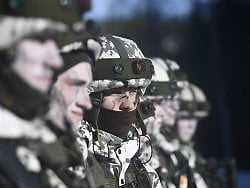Comparatively small Finland has always tried to maintain good relations with its large Russian neighbor. Joining NATO was out of the question. The invasion of Ukraine changes everything. It could do the opposite of Putin’s foreign policy goals.
Amid the crisis surrounding Russia’s attack on Ukraine, US President Joe Biden is taking his time with a country that, at first glance, does not play a major role in world affairs. Finnish President Sauli Niinistö visits the White House on Friday. His country shares a 1,340-kilometer land border with Russia, which is precisely why it has been trying to remain neutral since the Second World War. But Vladimir Putin’s aggressive foreign policy, of all things, with which he wants to move NATO further away from Russian territory, shakes the Finns’ conviction that they are safer between two chairs: Public sentiment is moving more and more in the direction of NATO membership.
For the Kremlin, such a step would undoubtedly amount to an open provocation. The 1997 Budapest Memorandum stipulated that NATO should not permanently station troops on Russia’s border and that no country should enhance its security at the expense of the security of others. The previous head of the Munich Security Conference and longtime top diplomat, Wolfgang Ischinger, explained last week that Russia itself may have made this memorandum obsolete by invading Ukraine.
The Kremlin threatens
At the beginning of the week it became clear how much Moscow fears that Finland and its neighboring country Sweden would join NATO. In writing and in a harsh tone, Foreign Minister Sergei Lavrov asked the governments of both countries to declare whether they intend to expand their security at Russia’s expense. Last Friday, a Russian government spokeswoman threatened Finland: Should the country join NATO, it would have “serious military and political consequences.” There is also an ice age between the Scandinavian countries and their big neighbor to the east.
For Finland, the developments of the past few weeks and months are tantamount to a turning point: the country maintains close economic ties with Russia. Many Russians own holiday properties in Finland, Russian investments and cooperation are an important economic factor, which is why the Western sanctions hit Finland much harder than other EU countries. In 2019, investments of more than 1.5 billion euros flowed from Russia to Finland, ten times as much as Russia put into Swedish companies in about the same period.
To date, Finland has obtained more than 60 percent of the coal it burns from its neighbors. In order to achieve its climate goals, Finland wanted the Russian company Rosatom to build a nuclear power plant. This project is now shaky, especially since Rosatom holds a third of the Finnish company Fennovoima, which is supposed to operate the Hanhikivi 1 nuclear power plant. Economics Minister Mika Lintilä recently said in the Finnish parliament that in the current situation he could not possibly propose that the government grant Fennovoima the building permit for a nuclear power plant.
Marin supports debate
Joining NATO would make the project all the more difficult. According to a survey published on Monday, a large majority now supports this step. According to Finnish Radio, 53 percent of respondents are in favor of this move, 28 percent are against it and the rest are undecided. This majority has consequences: Two popular initiatives for accession clearly cracked the quorum of 50,000 signatures, forcing Parliament to deal with the issue.
In view of this encouragement, Prime Minister Sanna Marin explained that it “makes sense to discuss the attitudes of the parties” to NATO membership. Charly Salonius-Pasternak from the Finnish Institute for International Affairs described the result in an interview with the dpa news agency as “completely historic and extraordinary”. As recently as January, only 28 percent of Finns were in favor of NATO membership.
“Time change” also in Finland
Further developments are open and this is precisely what represents the greatest possible paradigm shift in Finland’s Russia policy: Up until now, the country has tried to be as predictable as possible for Moscow with a high degree of transparency, explain foreign policy researchers Sinikukka Saari and Jyri Lavikainen by the Finnish Institute for International Affairs (FIIA). In contrast to what has often been the case in the NATO countries in recent decades, the Russian perception of security is taken into account in every decision in Helsinki. The big neighbor is too powerful to carelessly burden the relationship – so far.
The Finns can empathize with the situation in the Ukraine, one of Russia’s neighbors, which is in doubt inferior. And they, like Sweden, decided to support Ukraine. Finland provides Ukraine with 1,500 anti-tank weapons and 2,500 assault rifles. The country is also donating 150,000 cartridges and 70,000 servings of field rations. “This is a historic decision for Finland,” said Marin. Unlike Germany with its anti-tank and anti-aircraft missiles, Finland is not only supplying war material disguised as defensive weapons. The country clearly opposed Russia in the Ukraine war.
If Putin wanted to keep NATO as far away as possible and deter neighboring countries from joining NATO, the opposite seems to have happened so far. Nevertheless, Finnish politicians are alarmed because joining NATO would fundamentally change relations with Russia. In this context, President Niinistö only recalled a statement made by Putin in 2016 in a “Spiegel” interview in mid-February. He said: “If we currently look across the border, we see a Finn on the other side. If Finland joins NATO, we see an enemy on the other side.”
